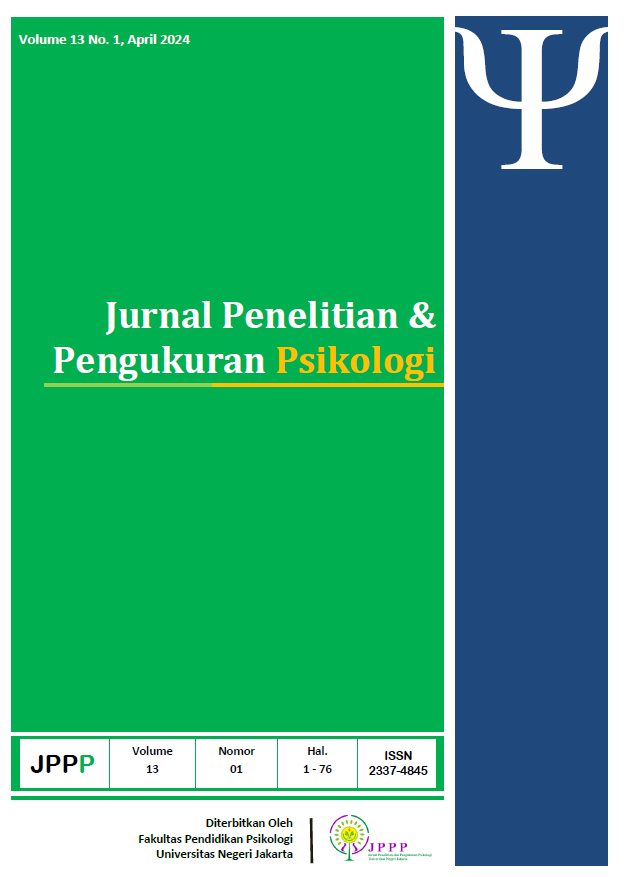Peristiwa Kerusuhan Mei 1998: Sebuah Gambaran Pengampunan Para Korban
DOI:
https://doi.org/10.21009/JPPP.131.06Keywords:
victims of the riots, May 1998, Chinese Indonesians, forgivenessAbstract
More than two decades have passed, and the events of the May 1998 riots have left trauma and fear in the victims up until this day. One of the consequences is there is a shifting view and behavior between Chinese Indonesians and Pribumi (Indigenous) community. Based on previous research, it was found that forgiveness could increase individual prosocial tendencies and be able to cope with trauma, especially in cases of racial violence trauma. Therefore, this research was conducted to find out about the forgiveness of the direct victims of the May 1998 riots. This study used a phenomenological approach with thematic analysis, with data collection methods in the form of interviews with three participants who were victims of the May 1998 riots. The data obtained from the interviews were then processed using the thematic analysis method. From the results of the study, it was found that the three participants had the determination to forgive the perpetrators and not to blame the Indigenous ethnicity for the riots that occurred, even though there were still shifting in the feelings and behavior of the Chinese ethnic towards the PribumiIndonesians as a result of the May 1998 riots.
References
Aspinall, E., Feith, H., & Klinken, G. v. (1999). The Last Days of President Suharto. Monash Asia Institute.
Braun, V., & Clarke, V. (2006). Using thematic analysis in psychology. Qualitative Research in Psychology, 3(2), 77–101. https://doi.org/10.1191/1478088706qp063oa
Cahyadi, R. (2019). Hubungan antara Pola Asuh Orang Tua yang Dipersepsikan terhadap Prasangka Mahasiswa Suku Bangsa Tionghoa. (Doctoral Dissertation, Sriwijaya University)
Cerci, D., & Colucci, E. (2018). Forgiveness in PTSD after man-made traumatic events: A systematic review. Traumatology, 24(1), 47–54. https://doi.org/10.1037/trm0000130
Christian, S. (2017). Identitas budaya orang Tionghoa Indonesia. Jurnal Cakrawala Mandarin, 1, 11. https://doi.org/10.36279/apsmi.v1i1.11
Freedman, S., & Zarifkar, T. (2016). The psychology of interpersonal forgiveness and guidelines for forgiveness therapy: What therapists need to know to help their clients forgive. Spirituality in Clinical Practice, 3(1), 45–58. https://doi.org/10.1037/scp0000087
García-Vázquez, F. I., Parra-Pérez, L. G., & Valdés-Cuervo, A. A. (2020). The effects of forgiveness, gratitude, and self-control on reactive and proactive aggression in bullying. International Journal of Environmental Research and Public Health, 17(16), 1–14. https://doi.org/10.3390/ijerph17165760
Hikmawati, C. L. (2017). Opresi berlapis perempuan etnis Tionghoa: Pemerkosaan massal terhadap perempuan etnis Tionghoa dalam tragedi Mei 1998 di Jakarta. Jurnal Politik, 2(2). https://doi.org/10.7454/jp.v2i2.76
Himawan, E. M., Pohlman, A., & Louis, W. (2022). Revisiting the May 1998 Riots in Indonesia: Civilians and Their Untold Memories. Journal of Current Southeast Asian Affairs, 41(2), 240-257. .
Himawan, E. M. (2020). 22 tahun setelah kerusuhan anti-Cina Mei 1998, riset ungkap prasangka dan trauma masih ada. The Conversation, 1–5. https://theconversation.com/22-tahun-setelah-kerusuhan-anti-cina-mei-1998-riset-ungkap-prasangka-dan-trauma-masih-ada-138962
Huda, S. (2010). Orang Indonesia Tionghoa dan persoalan identitas. Kontekstualita: Jurnal Penelitian Sosial Keagamaan, 25(1), 165–174.
Hutahaean, J. (2014). Dampak kerusuhan Mei 1998 terhadap pengusaha etnis Tionghoa di Petukangan Jakarta Tahun 1998-2003. Journal of Indonesian History, 3(1), 27–33.
Jenkins, T. D. (2016). Forgiveness as a Healing Agent in Cases of Traumatic Violence. Simon Fraser University.
McCullough, M. E., Rachal, K. C., Sandage, S. J., Worthington, E. L., Brown, S. W., & Hight, T. L. (1999). Interpersonal forgiving in close relationships: II. Theoretical elaboration and measurement. Journal of Personality and Social Psychology, 75(6), 1586–1603. https://doi.org/10.1037/0022-3514.75.6.1586
McFarland, M., Smith, C., Toussaint, L., & Thomas, P. (2011). Forgiveness of others and health: do race and neighborhood matter? The Journals of Gerontology. Series B, Psychological Sciences and Social Sciences, 67, 66–75. https://doi.org/10.1093/geronb/gbr121
Noviyanti, N., Puji, R. P. N., & Hartanto, W. (2019). Gerakan reformasi 1998 di kecamatan Kaliwates kabupaten Jember (Pengrusakan Toko Milik Etnis Cina). MUKADIMAH: Jurnal Pendidikan, Sejarah, Dan Ilmu-Ilmu Sosial, 3(2), 1–5. https://doi.org/10.30743/mkd.v3i2.1230
Oktaviany, S., Ginting, B., Ekwandari, Y. S., Unila, F., Prof, J., Brojonegoro, S., 01, N., & Lampung, B. (2019). Etnis Tionghoa pada peristiwa kerusuhan Mei 1998 di Jakarta. PESAGI (Jurnal Pendidikan Dan Penelitian Sejarah), 7(5).
Putri, R., Puji, N., & Harfile, W. (2020). Gerakan reformasi 1998 di kecamatan Kaliwates kabupaten Jember. HISTORIA : Jurnal Program Studi Pendidikan Sejarah, 7(2), 207–214. https://doi.org/10.24127/hj.v7i2.2002
Salim, L., & Ramdhon, A. (2020). Dinamika konflik kerusuhan Mei 1998 di kota Surakarta melalui perspektif korban. Journal of Development and Social Change, 3(1), 58–70.
Satici, S. A., Uysal, R., & Akin, A. (2014). Forgiveness and vengeance: The mediating role of gratitude. Psychological Reports, 114(1), 157–168. https://doi.org/10.2466/07.09.PR0.114k11w9
Setijadi, C. (2019). Anti-Chinese sentiment and the ‘return’of the pribumi discourse. In G. Fealy & R. Ricci (Eds.), Contentious Belonging: The Place of Minorities in Indonesia (pp. 194-213). ISEAS.
Sinuhaji, D. K. (2017). Perubahan Nilai Budaya Etnis Tionghoa Di Kota Medan Dalam Studi Kasus Kerusuhan Mei 1998 [Universitas Sumatera Utara]. http://repository.usu.ac.id/handle/123456789/65724
Winarnita, M. S., Chan, C., & Butt, L. (2020). Narratives of exile twenty years on: long-term impacts of Indonesia’s 1998 violence on transnational Chinese-Indonesian women. Identities: Global Studies in Culture and Power Journal, 27(2), 191-209.
Worthington, E. L. J., Hook, J. N., Utsey, S. O., & Williams, J. (2007). Decisional and emotional forgiveness: Conceptualization and development of self-report measures.pdf. Positive Psychology Summit, 1–39.
Worthington, E. L., Lavelock, C., vanOyen Witvliet, C., Rye, M. S., Tsang, J. A., & Toussaint, L. (2015). Measures of forgiveness: Self-Report, physiological, chemical, and behavioral indicators. In Measures of Personality and Social Psychological Constructs (Issue December). Elsevier Inc. https://doi.org/10.1016/B978-0-12-386915-9.00017-6







